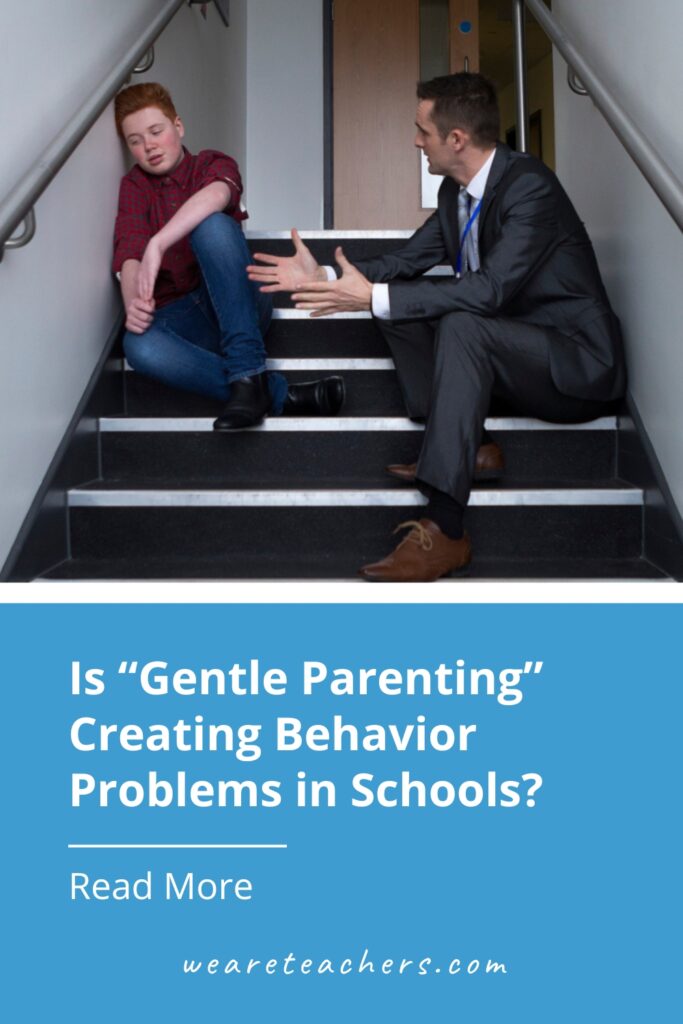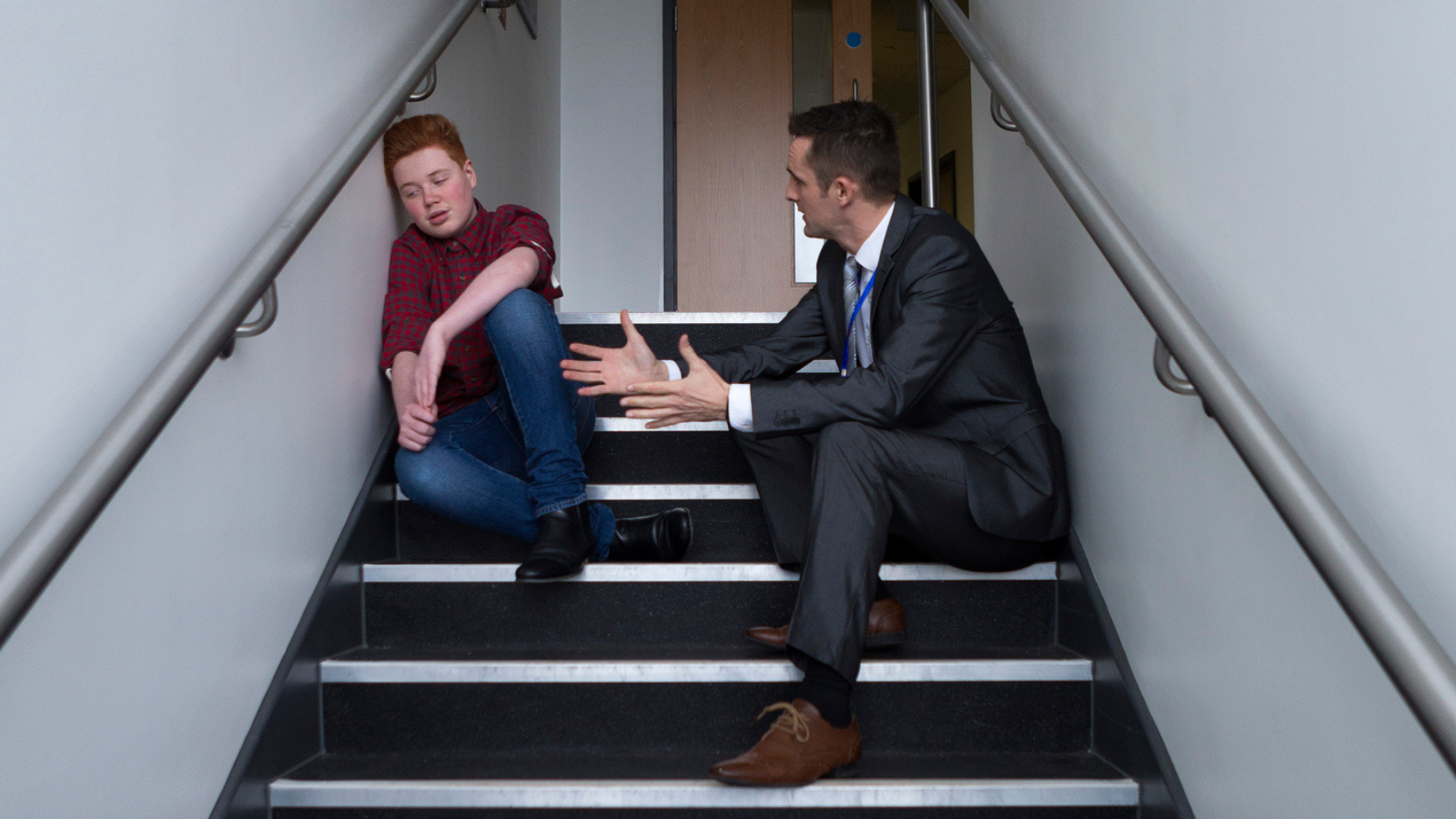If you have kids, teach kids, or know people who do either, you’ve probably heard of gentle parenting.
The parenting style has had a meteoric rise in popularity in the last few years, especially on social media. Unlike traditional “authoritarian” methods that focus on the child’s behavior, gentle parenting focuses on the parent’s behavior and creating a secure bond as well as a supportive environment for the child’s growth. This includes employing positive reinforcement over punitive measures and teaching values and behaviors through guidance rather than coercion.
“Gentle parenting is rooted in deep respect for children,” psychologist Sarah Ockwell-Smith told HealthDay. “In short, I describe it as ‘the way you wish your parents had treated you when you were a child.'”
If there’s any group of people (besides parents) who can get behind positive discipline, empathy-based guidance, and emotional regulation, surely it’s teachers, right?
Here’s the problem: Some teachers are saying the “side effects” of gentle parenting are creating behavior problems at school.
First, let’s look at what teachers are saying on the topic in this Reddit post.
“It makes students think every part of the day is up for negotiation.”
“I have several that actually negotiate with me ‘we can go later’ or ‘I want to go now’ or my favorite ‘it’s stopped raining, we can go to recess now.’ Or just flat out say no when I tell them to clean up or line up. When I talk to the parents, they freely admit they let their kids decide when to go to the store, when to go to bed, when and what to eat, etc. And when I say school doesn’t work like that, we have a schedule and lesson plans and expectations, I just get helpless shrugs. We always have one or two like this, but this year, we have MORE.” —the_owl_syndicate
“It assumes teachers can give the same attention to 30+ kids that parents give to one or two at home.”
“I think where the two, this parenting style and a classroom, can easily clash is the number. You have one or two kids? Yeah, we can take the time to really work through things. You’ve got 30 all with their own individual needs and one teacher to manage them all? It’s not necessarily realistic to be able to do the coaching and the open conversation in the way it would probably need to be done.” —Gold_Repair_3557
“It doesn’t account for the difference in stamina and frustration level between tasks at home vs. school. “
“If your kid spends all their time playing video games and watching TikTok, and you never make them do chores or homework, you’re never going to see the behaviours that the classroom teacher sees. You’re never asking them to do anything they don’t want to do for an extended period of time like we are.” —TheDarklingThrush
“Children come to school expecting their teacher to have the same availability and time for them as their parents do.”
“I don’t really think of myself as an authoritarian teacher, in fact, I’m one of the teachers pupils will come to when they haven’t done something they should for another teacher to have me help them repackage what they want to say in an acceptable, professional way. I try and say ‘We’re doing this because …’ Or ‘This is important for …’ But I also simply don’t have time to work with every student in my room individually about why they should do something or the point of every instruction. Simply for logistics, I need at least the majority to do as asked if at all possible. One important part of Gentle Parenting absolutely must be different expectations in different places and that not everyone at every time has time and ability to negotiate and discuss with you.” —NyssaofTracken
“It makes everything seem like a big deal.”
“From a parent perspective, I think it’s great to validate feelings and stop hitting our kids and calling it discipline, but I think the problem is that not everything needs to be a ‘big deal.’ Like if my kid falls and gets mildly hurt, just get back up, we don’t need to talk about how I realize that was scary for you and it’s okay to cry as long as you need to and all feelings are important… I think gentle parenting creates anxiety in a lot of kids because they’re looking to us to see how to handle their emotions, and the truth is that not every feeling needs to be dissected. It’s okay to say, ‘You’re fine!’ and that be the end of it.” —lemondrops42
So, does this mean gentle parenting is bad?
Not at all. Evaluating most things from an all-or-nothing standpoint is rarely helpful. Plus, I think our world would be a better place if we all—teachers, parents, online comment sections—practiced a little more gentleness with one another.
Certainly from a teaching perspective, these reports are concerning. But I think what’s happening is more complicated than “gentle parenting = bad” or “gentle parenting results in these kinds of students”.
What if these behaviors aren’t the “side effects” of one single agreed-upon version of “gentle parenting,” and are instead the confusion that results from individual interpretation of a vague term?
One of the problems with understanding gentle parenting’s impact in schools is that there’s no agreed-upon definition for what gentle parenting is. There are no official “gentle parenting” guidelines or tenets; no single authority figure to ask for clarity. And in this gray area, there’s a lot of room for interpretation.
For instance, one popular thought leader within the gentle-parenting umbrella suggests children don’t need potty training (though every child is different, it’s hard to not spot a connection between this belief and kindergarten teachers reporting a sudden influx of children arriving at school in diapers). Another might suggest that adults should parent without using the word “no,” even though psychologist Sarah Ockwell-Smith, who is sometimes credited with gentle parenting, insists that “no” definitely has a place in the process.
If parents are grabbing isolated bits of advice from #gentleparenting on Instagram or TikTok, they could be trying to make sense from two or more accounts with completely different—even contradictory—methods. And if they feel pressured or shamed to use that parenting advice at all costs despite their child’s individual needs, I think that’s one (of many) ways we get kids who are struggling at school.
There will always be different styles, trends, and approaches to parenting. That’s a good thing.
Maybe the “best” thing parents can do is choose a style that works for their family and periodically evaluate, tweak, and adapt that style based on feedback. Feedback from the child as well as from stakeholders in the child’s life—teachers, coaches, caretakers, and other “village” members invested in their success.
Even Dr. Becky Kennedy, a popular clinical psychologist that many place under the “gentle parenting” umbrella (even though she doesn’t define her work this way), insists that her parenting advice is not to be taken as the end-all-be-all for every child. Here’s a quote from her interview with Adam Grant back in February:
“I think it’s been helpful to just, just remember that there’s no one size fits all approach. Right? That these ideas, everything I put out there, and I wanna make this clear, after receiving this criticism, is meant to be considered with skepticism, to see how it resonates, and then to be combined with what you know about yourself and your family. You are the expert, and these are frameworks and ideas to consider if useful.”
—Dr. Becky Kennedy
Jessica Grose of the New York Times puts it this way: “There’s more than one way to raise kids who thrive.” I think most teachers would agree that our students who thrive can, most of the time (and in an age-appropriate way):
- Follow directions from a teacher
- Practice kindness to their classmates
- Respect boundaries set by staff, teachers, and classmates
- Bounce back from small emotional hiccups independently
- Accept routine critique/feedback as a part of learning
And if your child can’t do these things, but you’re aware of it and working on it? Teachers are thrilled that you’re trying—trust me. These are skills we’re all still learning.
For more articles like this, be sure to subscribe to our newsletters.


